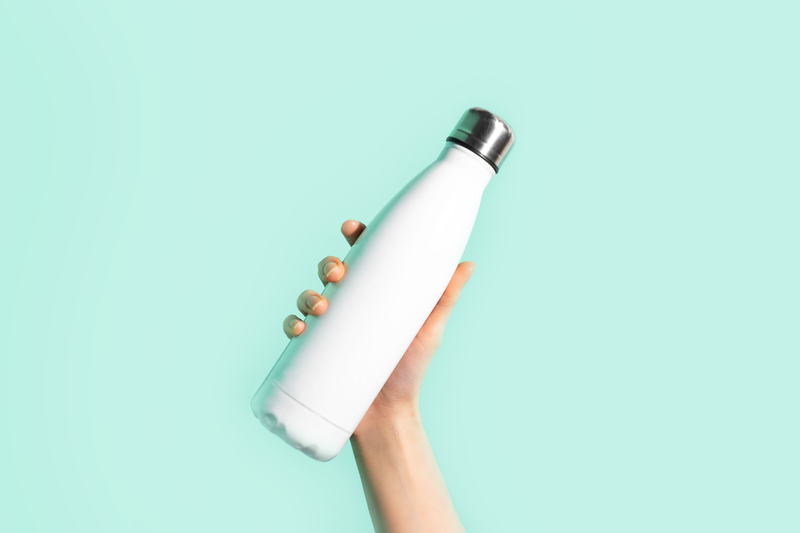Ask the Coaches: How Often Should You Wash Your Water Bottle?

Q: Coaches, per your advice, I have started carrying my water bottle with me everywhere I go. I feel so much better now that I’m drinking more water. I’ve noticed a big improvement in my energy levels, how my skin looks, and even in my weight-loss journey. My favorite water bottle is an insulated bottle that my daughter bought me for my birthday. I literally use it every day.
Now, one of my co-workers has been after me, saying how gross it is that I use it so often, and I’ll probably get sick from using the same water bottle. She lashes at me, “Don’t you ever wash it?” Of course I do. I wash it almost every night (although I admit I’m not perfect), so it’s ready for use the next day. I only put water in it, so do I really need to wash it after every use?
How often should I be washing my water bottle?
– Wendy
A: Wendy, we’re so glad to hear that you are drinking more water and enjoying many of the benefits of hydrating your body better and more consistently! Some of the many benefits of proper hydration include:
- Preventing dehydration, which can lead to headaches, dizziness, dry mouth, and constipation
- Clearer thinking
- Improved mood
- More comfortable joints
- Younger-looking skin
- Digestive support
- Reduced symptoms of asthma and allergies
- Weight loss support
- And many others…
Once you start drinking more water, all these benefits make it an easier habit to continue as you simply feel so much better.
Of course, one of the easiest, most convenient ways to make sure you’re properly and consistently hydrating your body is to take your water bottle with you wherever you go. And it’s especially important for the environment to use a reusable water bottle. In the U.S. alone, more than 60 million plastic water bottles are thrown away—ending up in landfills and as litter in our streets, parks, and waterways. Sadly, a mere 9 to 12% of disposable water bottles are actually recycled, as it’s cheaper and easier to just make more bottles than to recycle them. 1, 2
Unlike water glasses that stay at home and likely get washed after every use, reusable water bottles tend to get neglected in the cleaning department. Yet, like you said, the only thing you put in them is water. So, how dirty can a water bottle really get?
If you’re cleaning your water bottle every day, then you’re right on track. It is ideal to clean your water bottle daily as long as you aren’t sharing it with anyone else. While we all have bacteria that live within our mouths and throats, our immune systems are already familiar with our own bacteria and how to balance them.
Why You Need to Clean Your Water Bottle?
Sharing water bottles, however, can also mean sharing germs, including bacteria and viruses we’re not used to. This includes germs that can lead to illnesses, like strep throat, colds, flus, etc. Because water bottles are (obviously) a “wet” environment, they make for a good breeding ground for opportunistic bacteria (e.g., E. coli) or molds that can lead to nausea, vomiting, or diarrhea to proliferate.
What if you skip a day or two between washes? Even then, it shouldn’t be a problem. As long as your immune system is strong and balanced and you aren’t sharing your bottle, you can likely go a day or two between washes. That said, germs are everywhere, and they can easily transfer onto your water bottle, and thus, into your body. So, even if your water bottle looks clean or is only used at home, you still want to make sure you wash it daily (or at least close to daily).
In other words, it’s a great idea to get into the practice of giving your water bottle a quick wash in hot, soapy water with a clean scrub brush to remove any dirt and grime at the end of each day. Don’t forget to thoroughly clean the lid and the outside of the bottle as well! Then, allow it to dry completely overnight, so it’s ready to keep you hydrated the next day.
You’ll especially want to make sure you clean your water bottle daily if you take it with you to work, school, the gym, or other environments that can be teeming with germs. In fact, during cold or flu season (or during a pandemic), you’ll want to wash your water bottle as soon as you return home, as studies have found that pathogens can grow on and in unwashed water bottles. 3
How to Sanitize Your Water Bottle
Even though you’re washing your water bottle daily, you’ll also want to make sure it’s sanitized at least weekly. You may or may not be able to just toss your water bottle on the top rack of the dishwasher at the end of the week to sanitize it. You’ll need to check the cleaning instructions on your specific water bottle. Many, but not all, insulated water bottles are dishwasher safe. If it isn’t dishwasher safe, you can use a sanitizing solution like diluted vinegar, 3% hydrogen peroxide, or bleach to kill off any germs.
For example, to sanitize your water bottle after washing it, pour in around ¼ cup of hydrogen peroxide and close the lid tightly. Shake well and then pour the liquid out before rinsing the water bottle and allowing it to dry. If you use vinegar, you’ll want to fill it halfway full with vinegar and the other half with water. For bleach, you’ll only need a teaspoon of bleach, filling the rest of the bottle with water.
For a deeper clean or to remove any stains, you can fill your water bottle with hot water and a bit of vinegar and allow it to sit overnight. The next morning, throw out most of the liquid before adding two tablespoons of baking soda. Swirl the liquid and baking soda to make a paste. (The goal is not to make a vinegar/baking soda volcano—so don’t overdo it with the vinegar, water, or baking soda!) With a bottle or kitchen scrubby, scrub the interior of the bottle, rinse well, and allow it to dry before using again.
Finally, there are also water bottle cleansing tablets available. You can even use effervescent denture cleaning tablets. Just fill the bottle with water, drop in a tablet, allow it to dissolve, and let it sit. Rinse out well and dry normally.
Keep up the great work, Wendy, of drinking water throughout the day, and as long as you’re continuing to clean your bottle nightly and sanitize it weekly, you should be all set! Just remember, even if your water bottle looks clean, it’s better to err on the side of safety and give it a wash anyway.







